 Abraham Lincoln
If given the truth, the people can be depended upon to meet any national crisis...
Abraham Lincoln
If given the truth, the people can be depended upon to meet any national crisis...
 Guildford news...
for Guildford people, brought to you by Guildford reporters - Guildford's own news service
Guildford news...
for Guildford people, brought to you by Guildford reporters - Guildford's own news service
A Walk On The Wild Side With Simon Cowell MBE
Published on: 18 May, 2015
Updated on: 18 May, 2015
The Wildlife Aid Foundation is dedicated to the rescue, care and rehabilitation of sick, injured and orphaned wild animals throughout Surrey. DANI MAIMONE reports from the charity’s base in Leatherhead.
The majority of people in the UK are probably unaware that one of our iconic British mammals is under threat.
I’m talking about that prickly, cute little creature the hedgehog. Did you know that numbers have fallen so dramatically since the 1950s that they could see urban extinction by 2025?
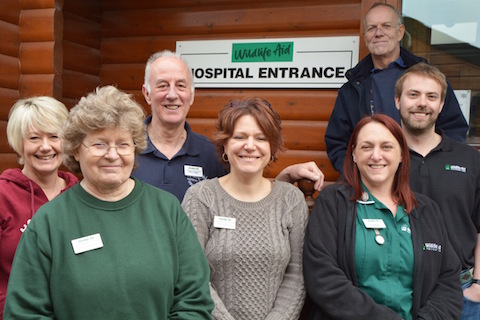
Simon Cowell MBE (top right) with some of his team: below him Jonathon Frost volunteer vet and below him Lucy Kells. Picture by Dani Maimone.
According to Simon Cowell MBE, presenter and broadcaster and the founder of the Wildlife Aid Foundation charity based in Leatherhead, numbers have dropped from 30 million to one million in just over 60 years. The statistics are very worrying indeed.
“All British wildlife is in trouble,” says Simon, “and we are all part of the food chain, if we don’t look after our wildlife we will struggle too.”
Thankfully Simon is on the case and his passion for nurturing, protecting and nursing injured creatures back to health has not waned in the 35 or so years he has been doing this job. He set up the foundation in the 1980s and something that started out as a small local wildlife rescue charity has since evolved into a leading UK animal welfare and environmental organisation.
He may joke that in his words, “I have been doing this job far too long, it’s awful,” but that’s just his sense of humour. It’s very clear walking around the centre with him that his passion for what he does is still very much intact. He is still very hands on and will often go off on a rescue mission whatever the time of day. It’s no wonder he was recently voted one of Surrey’s local heroes.
So what does Wildlife Aid actually do? Staff and volunteers are very much involved with and dedicated to the rescue, care and rehabilitation of sick, injured and orphaned wild animals. They deal with somewhere in the region of more than 20,000 wildlife emergencies every year which is a staggering number for a small organisation and it’s also tantamount to the dedication of their many volunteers and veterinary staff that they are able to pull this off.
Their aim is to return all sick, injured and orphaned animals back into the wild once they have recovered.
In 1996 Wildlife Aid started broadcasting its work in a TV series known as Wildlife SOS on Animal Planet. The series is also aired on the Discovery Channel and is one of the longest running programmes of its kind. It features the work of the staff and volunteers and can now be seen on-line on YouTube in regular episodes produced by the Wildlife Aid Foundation.
It’s this time of year that it starts to get very busy. The wildlife is breeding, birds and mammals have young ones to look after and every now and again something goes wrong a creature is abandoned.
“People are often too quick to rescue what they think is an abandoned orphan,” says Simon. “This happens a lot with birds and to some extent deer. It’s best to wait for a bit and see if the mother returns. If you are unsure then give us a call and we can asses the situation and come out and help.”
The Wildlife Aid Foundation is fortunate enough to have an army of dedicated volunteers somewhere in the region of 300 all together and a number of veterinary staff who give their time for free which is just as well with a daily running cost of about £1,000 a day.
I ask Simon where the money comes from. “I’m not really sure, we have lovely people who fundraise for us and every year I think we will struggle to make enough to keep going but somehow we manage it. We get through a staggering amount of food for the wildlife, in the region of 15,000 cans of dog food throughout the winter just for the hedgehogs.”
The centre runs 24/7 with many volunteers working long hours. Lucy Kells the Foundation’s hospital manager says: “It’s hard work and long hours but very rewarding. We are part of a team and everyone clubs together. When we get to release the animals back into the wild everyone is a part of that and it’s amazing.”
Lucy has been working with the foundation for a few years and got involved after watching the wildlife SOS series on TV. She tells me the baby squirrels are her favourite animals and seeing them for myself I can see why. They certainly have the cute factor and I discovered that a baby squirrel is called a kitten.
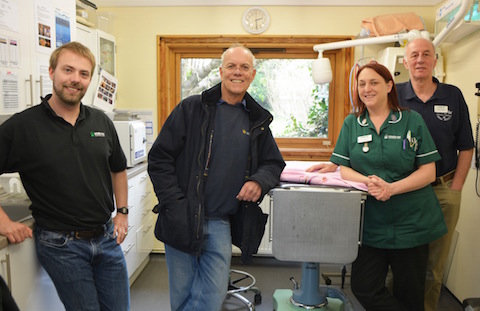
Pictured in the operating theatre with Jonathon Frost left, Simon Cowell MBE centre, Lucy Kells foundation hospital manager, and a volunteer. Picture by Dani Maimone.
It’s important to state that the foundation is generally very hands off with the wildlife where possible so as not to imprint on the animals. Fox cubs for instance are monitored with cameras and human contact kept to a minimum.
They will have a ‘soft release,’ back into the wild, kept in some form of container and fed outside at the release site otherwise they wouldn’t stand a chance. Adults by contrast are given a ‘hard release,’ sent straight back out there once they have recovered from any injury or illness.
It’s not always straightforward though. Volunteer vet Jonathon Frost who normally works with cats and dogs adds: “It’s definitely a job of highs and lows. We see everything from swans to deer and badgers. It’s not always a positive outcome and animals do die which is heartrending for the staff when we put so much effort into trying to save them.”
Simon adds: “In the next few months we can have as many as up to 1,000 patients here at any one time.”
The numbers are huge and an eye-opener. I for one am very impressed with all the work the Wildlife Aid Foundation is doing to save and nurture this country’s wildlife and in total admiration of Simon and his team. We could do with more people like them around to help our British wildlife.
To find out more click here for Wildlife Aid’s website. go to their website at http://www.wildlifeaid.org.uk/
Check out the foundation’s Wildlife SOS videos at:
https://www.youtube.com/watch?v=CpglLc7Oq2s and listen to the Brooklands radio interview with Dani at http://www.brooklandsradio.co.uk/podcasts/WildlifeAidFoundation2015-04-05.mp3
You can also support the Saving Harry the hedgehog campaign on its website and watch the video on YouTube. https://www.youtube.com/watch?v=68XJaquT_PY
Responses to A Walk On The Wild Side With Simon Cowell MBE
Leave a Comment Cancel replyPlease see our comments policy. All comments are moderated and may take time to appear.
Recent Articles
- Guildford Institute’s Crowdfunding Project for Accessible Toilet in its New Community and Wellbeing Centre
- Letter: Guildford – Another Opportunity Missed?
- Letter: GBC’s Corporate Strategy – Where Is the Ambition?
- My Memories of John Mayall at a Ground-breaking Gig in Guildford Nearly Six Decades Ago
- Westborough HMO Plans ‘Losing the Heart of the Street’ Says Resident
- College Invests to Boost Surrey’s Economy and Close Digital Skills Gap
- Community Lottery Brings Big Wins for Local Charities
- GBC Housing Plan Promises ‘A Vibrant Urban Neighbourhood’ Near Town Centre
- Hospital Pillows ‘Shortage’ at the Royal Surrey
- Updated: Caravans Set Up Camp at Ash Manor School


Recent Comments
- Ian Macpherson on Updated: Main Guildford to Godalming Road Closed Until August 1
- Sara Tokunaga on GBC Housing Plan Promises ‘A Vibrant Urban Neighbourhood’ Near Town Centre
- Michael Courtnage on Daily Mail Online Reports Guildford Has Highest-paid Council Officer
- Alan Judge on GBC Housing Plan Promises ‘A Vibrant Urban Neighbourhood’ Near Town Centre
- John Perkins on GBC Housing Plan Promises ‘A Vibrant Urban Neighbourhood’ Near Town Centre
- S Collins on GBC Housing Plan Promises ‘A Vibrant Urban Neighbourhood’ Near Town Centre
Search in Site
Media Gallery
Dragon Interview: Local Artist Leaves Her Mark At One of England’s Most Historic Buildings
January 21, 2023 / No Comment / Read MoreDragon Interview: Lib Dem Planning Chair: ‘Current Policy Doesn’t Work for Local People’
January 19, 2023 / No Comment / Read MoreA3 Tunnel in Guildford ‘Necessary’ for New Homes, Says Guildford’s MP
January 10, 2023 / No Comment / Read More‘Madness’ for London Road Scheme to Go Ahead Against ‘Huge Opposition’, Says SCC Leader
January 6, 2023 / No Comment / Read MoreCouncillor’s Son Starts Campaign for More Consultation on North Street Plan
December 30, 2022 / No Comment / Read MoreCounty Council Climbs Down Over London Road Works – Further ‘Engagement’ Period Announced
December 14, 2022 / No Comment / Read MoreDragon Interview: GBC Reaction to the Government’s Expected Decision to Relax Housing Targets
December 7, 2022 / No Comment / Read MoreHow Can Our Town Centre Businesses Recover? Watch the Shop Front Debate
May 18, 2020 / No Comment / Read More



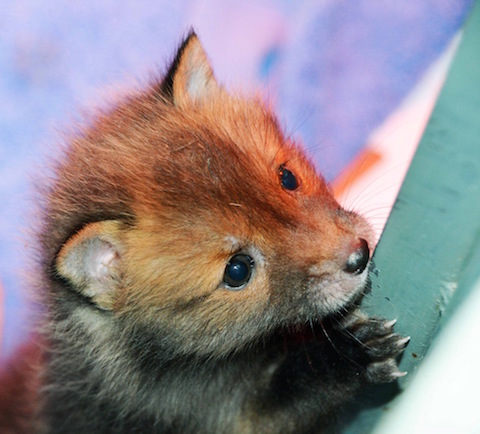
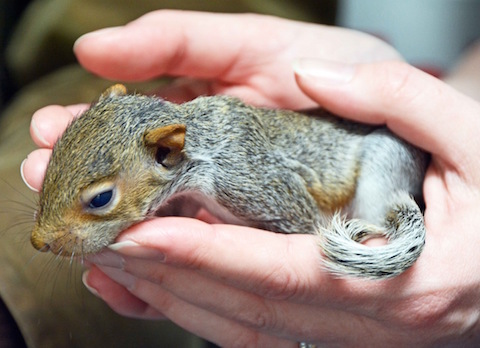
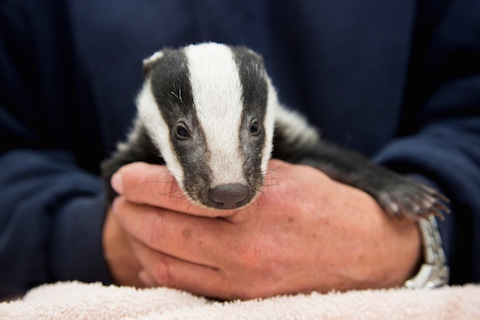
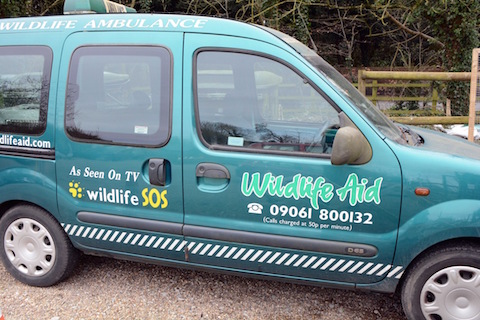






Renata Hay
May 19, 2015 at 11:47 pm
Great article which really does ‘my heroes’ justice. Hope this generates a lot more support for these dedicated people.